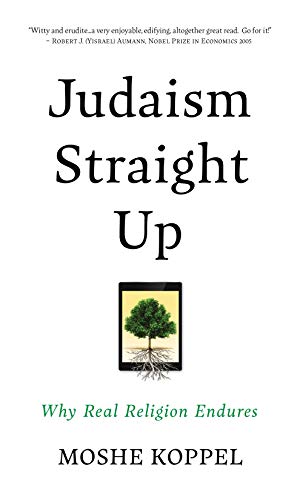Heidi and Moshe—two young Princeton University scholars, one secular and cosmopolitan, the other religious and Zionist—are bickering. What’s the big surprise? They hold diametrically opposing worldviews. They argue whether Jews should adopt or reject their national identity. “How can you justify your narrow tribal loyalty?” asks Heidi, a student in the faculty of humanities. “Isn’t the lesson of the Holocaust that we Jews must never put our parochial interests ahead of others’ interests? We should know better than anyone what happens when that lesson isn’t learned.” Moshe, a young Ph.D. in mathematics, is rendered speechless. He was not prepared for that blow. He sat before her, as he later testifies, “slack-jawed, staring at her uncomprehendingly.” Forty years later, as a professor emeritus of computer science at Bar-Ilan University and chairman of the Kohelet Policy Forum, Moshe Koppel published his detailed response to Heidi in his book Judaism Straight Up: Why Real Religion Endures, also aptly translated to Hebrew by Alon Shalev with the participation of Tsur Erlich as Living Like a Jew: Why Tradition Will Continue to Bury the Prophets of Its Demise.
In the ongoing dialogue between tradition and modernity, nationalism and cosmopolitanism, it is vital that something does not get lost: faith.

By Moshe Koppel
(Maggid Publishers, 2020)
Koppel’s world is split between tradition and modernity, between Jewish ethnicity and Western cosmopolitanism, betweenreligious faith and scientific research. He is at home in each of these realms, yet they seem to represent “different facets of [his] social, religious, and intellectual experience.” The book is intended—though not explicitly described as such—to serve as a guide to the perplexed of this generation. There are those who shut themselves up in a communal ghetto behind religious walls, rejecting modernity, and there are those who, due to this confusion, detach completely from tradition as outdated and meaningless. Koppel seeks a model for a balanced Judaism committed to Jewish law but not afraid of enlightenment.
With an eye-opening and highly entertaining methodical style, Koppel formulates his arguments by means of human figures not quite in dialogue. The book’s protagonist takes the form of an old and grouchy Jew, a Holocaust survivor named Shimen, with whom he prayed at the Gerer Hassidic shtiebel in Manhattan. Shimen and his friends, including Moshe’s grandfather, were “God-fearing Jews, but they felt sufficiently at home with God to take liberties as necessary.” The author does not provide the reader with a list of these liberties, but the picture reflected here is of wholly devout,pious Jews who admittedly abandoned the outward appearance of Gerer Hassidim but would not even pour boiling water over a tea bag on Shabbat.
Alongside Shimen is the character of Heidi, an attractive and graceful student, with a good sense of humor and an endearing character. Her parents were active in a Conservative synagogue on Long Island and kept kosher at home but not outside the house. At Princeton, she broadened her horizons, making friends from diverse backgrounds. Orthodox Jews seemed narrow-minded to her, especially in their treatment of Gentiles. She also criticized the inferior status of JewishOrthodox women in public rituals, such as prayer, Torah study, and the marriage ceremony. Shimen’s and Heidi’s views are juxtaposed throughout the book, even though they would not likely have interacted had they met in person. It isPrinceton’s kosher dining room that provides an opportunity for an argument to develop.
What conditions are necessary for the prosperity of human societies? That is the fundamental question to which the entire book aims to respond. Koppel claims that Shimen’s community is sustainable but that Heidi’s “is doomed.” Why? Because societies “need rich systems of social norms … in order to cohere and survive.” According to Koppel, Shimen lives in a rich system of halakhic social norms, “including public rituals, food taboos, kinship rules, and commercial-exchange regulations,” and special obligations toward other Jews. Heidi’s moral system, on the other hand, is limited to an overriding universal principle of avoiding harm to any person. In a nutshell, Koppel argues that tradition is necessary for society, whereas Heidi’s society is detached from tradition and therefore lacks bonds that rely on tradition, ethnicity, or history that would enable it to survive over time.
Richard A. Shweder and Jonathan Haidt, two social scientists, have identified a core moral system consisting ofthree fundamental principles: (1) Fairness toward other persons and their rights; (2) loyalty to one’s family, community, or nationality; and (3) restraint and respect for a certain order. Against this backdrop, Koppel argues that the moral systems that guide Shimen and Heidi are completely different. He convincingly argues that these three elements are intrinsically incorporated into Shimen’s halakhic worldview. Regarding Heidi and her friends, on the other hand, they value the principle of fairness to the exclusion of those of loyalty and restraint.
Since Koppel tried “to represent Heidi’s views fairly and to give her the strongest possible arguments on behalf of those views,” one wonders if she herself would have agreed to the aforementioned categorical division. Heidi has adopted a point of view sensitive to the needs of the weaker elements of society, and the pursuit of social justice is crucial to her. Moshe indeed argues with her about the proper ways to achieve that noble goal. However, is it possible to deny that the duty of loyalty guides Heidi in her actions, a loyalty to her fellow citizens of the United States of America and their welfare, overcoming religious, ethnic, economic, and political gaps dividing them? Rather, Heidi can argue back: Why does Shimen’s attitude toward his fellow American citizens rest upon the principle of fairness? Why is it not based on loyalty to the political community? Does a norm of fairness that applies to every person, whether or not he or she is a member of a given political community, enable the maintenance of a thriving liberal state? Where is the virtue ofpatriotism? We will return to this last question later.
Another problem: According to Koppel, Shimen’s opposition to marriage between a Jew and a non-Jew constitutes an example of loyalty to the Jewish nation. For Heidi, however, support for this marriage would be an example of restraint and respect for the liberal order in which the family should be made to overcome spouses’ religious differences. Thus, contrary to Shweder and Haidt’s thesis, the dispute between Heidi and Shimen is not necessarily based upon the primacy of loyalty or restraint. Rather, the controversy revolves around the questions: Should we prioritizeloyalty to the ethnic group (Shimen) or the political group (Heidi)? And should we exercise more restraint toward a religious order (Shimen) or a liberal order (Heidi)?
One question popped into my mind while reading the book in Princeton’s James Madison Program—where I am currently a postdoctoral research associate—located at the same address of the former university’s kosher dining hall. Is Shimen a patriot? Koppel writes: “Shimen identifies strongly with his community and much less with the country in which he happens to live.” On the one hand, the political community is a purely coincidental matter, and Shimen’s attitude toward it is indifferent and cold. On the other hand, he and his friends “are also grateful for the freedom and security afforded them by the United States and by the cultural openness so central to the American ethos.” Shimen acts more as a guest who utters an uncommitted thank you to his hosts in a hotel than as a member of a group of people working in fraternity to build their common homeland. What about patriotism? The vitality of patriotism is obviously apparent in Koppel’s discussion of the State of Israel. Adi, the Israeli figure equivalent to that of Heidi, is called to task for not identifying with her own political community. Here I wrote a side note to myself: “Adi wants to be Shimen!” Adi’s attitude toward her political community is cold; she wants America.
In the next phase of the book, Koppel takes on the question of faith with personal and intellectual courage from the point of view of the skeptic. He presents a position I believe will be difficult for much of the traditional Israeli public to digest. Not in vain does he choose to plant the bomb far away from the eyes of casual readers skimming through, content with the book title, preface and introduction, chapter titles, and opening and closing paragraphs. Only after exhausting readers with complex discussions in the fields of anthropology, game theory, political economy, halakhic development, and language theory, does the author turn to the meaning of faith. Even at that, he suggests that readers skip the third part of the book if they hold the naive faith instilled in them from infancy. Koppel addresses only those whose minds are torn between modern reason and traditional religious faith.
Shimen is not a philosopher. He holds true to Jewish religious faith, not by choice, but out of respect for the tradition into which he was born and educated. A man loves his son not because a rational investigation has revealed that his son is the best of his cohort. Similarly, a person maintains the Jewish faith not because a rational inquiry has revealedit has become clear to him as true but because of a previous personal commitment to the Jewish people. Thus, tradition precedes faith. For her part, Heidi’s attitude towards Shimen’s faith is skeptical. In the words of Professor Leon Kass: “We are too worldly to submit to the genius of tradition.” But Shimen does not feel the need to justify himself. He has no need to formulate his faith. Although “he had a few bones to pick with the Creator … for him this was an entirely intimate matter.” Koppel, however, did choose to examine his own faith here. He put in Heidi’s mouth a deadly attack on the standard principles of naive faith: the creation of the world, Torah from Heaven, miracles, the Holy Spirit, reward and punishment, the Chosen People, and the future resurrection of the dead. Koppel does not dismiss Heidi’s claims; some will say he accepts them. Thus, Koppel formulates an abstract faith.
First, he reduces naive faith to three principles: The Torah was given in divine revelation; those who keep the laws of the Torah will be rewarded; and the Jewish people move toward redemption. Next, he reduces these three principles to one abstract conception whereby “Judaism is a directed process linking the Jewish past with the Jewish future.” Here arethe details: (1) “Judaism developed helter-skelter from some special origins in the murky past” (Torah from Heaven); (2) “the process is limping forward in some vaguely-understood positive direction” (messianism); and (3) “leading a life bound to Torah is its own reward” (reward and punishment). Aside from the noteworthy statement that commitment to tradition precedes belief chronologically, Koppel’s bold conclusion is that life in light of tradition constitutes the essence of faith. Just like tradition, faith is a mindset linking past and future via a cautious optimism toward the prosperity of the concrete community. Thus, social prosperity has turned out to be, in Koppel’s thought, the fundamental touchstone for religious and traditional life.
Shimen is a devout Jew, a merchant by profession; he is neither an American patriot nor a philosopher. He thanks American society for its generosity but does not actively believe in the ideals upon which the United States was founded. He maintains a naive Jewish faith and feels no need to articulate or justify it in the face of Heidi and Koppel’s skepticism. If so, one might ask: In what way is he a modern person? Why was Shimen chosen as an example for a proper balance between tradition and modernity?
The reader might initially expect to encounter here arguments routinely propagated by the Israeli religious right. However, he will soon discover that Koppel’s discussion, rooted mostly in the United States, adds a rich layer of complexity to Israeli discourse. The author’s implicit approach to patriotism and his explicit approach to faith demand nothing less than a thorough rethinking of the dynamics of contemporary Israeli political theory. To the extent that the book participates in the controversies between conservatives and progressives, it also fuels an additional internal debate among Israel’s traditional camp. Which version of tradition should be promoted, and how?
A non-Jewish equivalent to Koppel’s thesis can be found in an article recently published by Allen C. Guelzo and James Hankins at The New Criterion. They call for a renewed balance between tradition and modernity and for a measureof loyalty to Western traditions and civilization. Sharing Koppel’s view, Guelzo and Hankins argue: “A culture that cannot balance the modern and the traditional, one that is all for the modern and all against the traditional, will end up destroying itself.” However, despite the commonality, there seems to be a gap between their view and Koppel’s. Koppel’stradition is ethnic, religious, and national while being explicitly immersed in a pluralistic conception recognizing the value of different human traditions. However, Guelzo and Hankins speak in favor of a Western tradition that itself contains diverse nations, ethnic groups, religions, languages, subcultures, and even countries with conflicting interests.Koppel shares a profound respect for the treasures of Western culture, but he does not explain whether this is due to respect for tradition in a broad sense transcending the Jewish tradition or whether it is a component of his modern thought. Discussing the concept of tradition from such a comparative perspective can add an important tier to the thesis presented in this book, which nevertheless presents a fascinating and elegantly elucidated position by an influencer of Israeli politics that is well worth getting to know.




